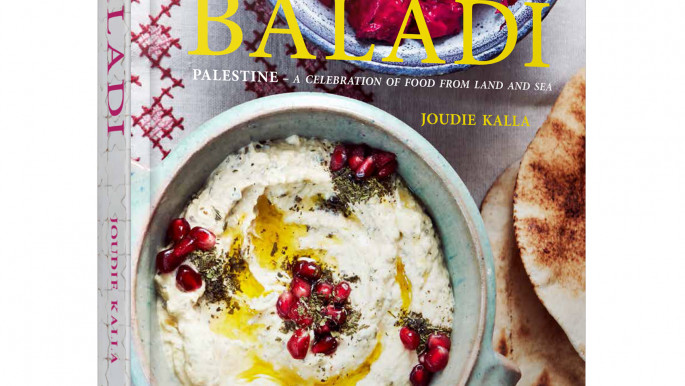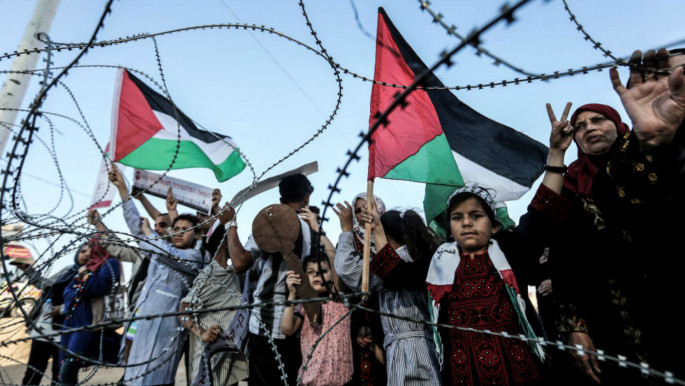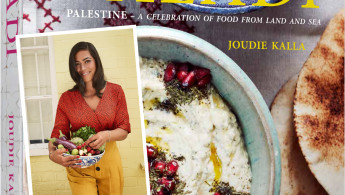'My country': Embark on a journey to Palestine with new cookbook Baladi
Like Rowling and her experience with getting the first Harry Potter book published, Kalla's Palestine on a Plate was initially rejected by several publishers – and it was almost always because they didn't want the word "Palestine" in the title.
Kalla refused to allow the erasure of the birthplace of her parents and grandparents and persisted until she found a publisher who took her on. And like Rowling, that persistence paid off.
Soon after it was in September 2016, Palestine on a Plate became a runaway success. The cookbook has now had five reprints so far, has sold copies in multiple countries and even received a positive review in The New York Times.
Fast forward two years, and Kalla has just released her second book Baladi: Palestine – a celebration of food from land and sea, which was not only named as The Times Food Book of the Year, but also received a glowing endorsement from the doyenne of cooking: Nigella Lawson.
"It was amazing. I started my career because of her," Kalla recalled.
"My dad at first didn't really want me to become a chef, he wanted me to go to university and have a 'safe job'.
"But there was one time when she came on TV – it was her first show ever I think – and we were around the living room watching her, and I turned and said to my dad, 'that's what I want to do'.
"He had an idea of what a chef was – mostly that it was a man's job – but when he saw Nigella on TV he changed his mind.
"Her endorsement of Baladi is almost like that has come full circle."
Born to Palestinian parents and raised in London, Kalla studied architecture and design at university before undertaking a master's degree in Paris. However, a career as a chef was inevitable. Being the fourth child in a family of five and the youngest of the daughters, Kalla spent much of her childhood happily in the kitchen with her mother – so much so that some of her earliest memories involve helping her in the kitchen.
 |
I have met and spoken with so many people who lost their mothers, fathers, grandmothers and never learnt a dish from them due to living far away from them. When I read that my recipes have brought back memories of those they have lost and a feeling of being back home, this makes it all worth it |  |
 |
|
She followed her passion for cooking by joining the Leiths School of Food and Wine and has since worked at prestigious restaurants around London – sometimes as the only female in the kitchen. She then ran a catering business and a deli, Baity Kitchen, which was where she started recording the recipes from her mother.
After the closure of Baity Kitchen in 2013, Kalla turned her passion for cooking Palestinian cuisine into an app – Palestine on a Plate – and an Instagram page of the same name. She also started running supper club nights, which helped her amass tens of thousands of Instagram followers before her first book was even released.
Kalla said Palestine On A Plate was not just the printed follow-up to the app and Instagram feed – it was also a poignant tribute to her family's history and memories in Palestine, told through recipes passed on from her mother, her grandmothers and her many aunts.
Baladi, on the other hand, sought a more interactive approach than her first cookbook, incorporating a mix of Kalla's own recipes, recipes from a crowd-sourcing scheme on Instagram, as well as a photographic journey of all the regions of Palestine from on-the-ground photographer Ahmad Al-Omry.
"Baladi was like a community project compared to Palestine on a Plate," Kalla said.
"I asked people on Instagram what recipes they wanted, and I got so many. The recipes I ended up using from that call-out has people's names and their contributions. With other people involved, it made it more personal and more emotional.
"This time, what I'm finding people love more about Baladi is that there's a journey. There's over a hundred pictures of Palestine, which I really wanted to have in the book.
"What I also wanted is for people to feel like they are travelling there or going back home. For people who have been to Palestine, and for people who haven't."
 |
What I also wanted is for people to feel like they are travelling there or going back home. For people who have been to Palestine, and for people who haven't |  |
Baladi also happens to be the phonetic spelling of the Arabic word for "my country", and Kalla hoped it showed a side of Palestine that was rarely ever seen in the news.
"I had the name of book before but when it all came together, it made so much more sense. It's my home, my land, my country," she said.
Despite her success, Kalla doesn't really believe she's a trailblazer. Indeed, her first cookbook may be the first that makes a specific reference to Palestine – rather than lumping it under "Lebanese" or a more generic "Middle Eastern" title – but she still acknowledges the work of other Palestinian chefs for paving the way for her.
These include Sami Tamimi, whom she counts as a friend and is known for his work with Yotam Ottolenghi, and US-based chefs Leila El-Haddad and Reem Assil.
"These women are beacons for Palestinian cuisine," Kalla said of the latter two.
"Even if we were working at the same time, they are definitely inspirations to keep going and moving forward in my aim to make Palestinian food global and familiar to all."
 |
|
| Read also: The Nakba: A Palestinian inheritance of trauma and resilience |
Kalla added that getting into cookbook writing may have happened by accident for her, but when the opportunity arose to put together the hundreds of recipes she had accumulated throughout her career, her purpose crystallised. Especially when it came to the role food played in connecting those in the Palestinian diaspora with their culture and heritage amid a story of oppression and apartheid for the last 70 years.
"As many Arabs know, it's very hard to get a recipe from our mothers because they don't weigh anything, and in these books, I hope to give a guide to people and then they can make it their own," she said.
"I have met and spoken with so many people who lost their mothers, fathers, grandmothers and never learnt a dish from them due to living far away from them. When I read that my recipes have brought back memories of those they have lost and a feeling of being back home, this makes it all worth it.
"We need to keep our legacy alive, our food, our culture, our families, our home and our land on people's lips and minds, the way we want to be seen and remembered, not how others want to portray us."
Order your copy of Baladi: Palestine – a celebration of food from land and sea here.
Elias Jahshan is an Australian journalist and editor based in London. He is a former board member of Arab Council Australia.
Follow him on Twitter: @Elias_Jahshan
The New Arab Book Club: Click on our Special Contents tab to read more book reviews and interviews with authors:



